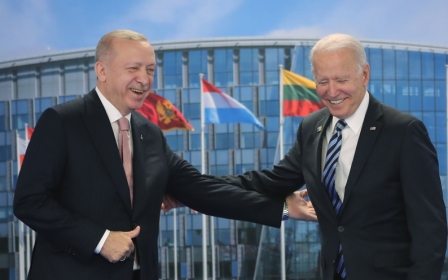Turkey: Egypt opposition media 'asked to stop airing some programmes'

Turkish authorities have asked Egyptian opposition media to stop broadcasting certain programmes from inside the country amid efforts to improve strained ties between Ankara and Cairo, Arabi21 news reported, citing officials with knowledge of the decision.
The move comes as a high-ranking delegation of Egyptian diplomats plans to visit Turkey following an eight-year rift, which has seen the regional powerhouses back rival factions in Libya's war and seen them at odds in a dispute over eastern Mediterranean waters.
The news report comes several months after Ankara ordered the same agencies to tone down their criticism of Egyptian President Abdel Fattah el-Sisi.
In March, a senior Turkish government official told Middle East Eye that Mekameleen and Al-Sharq, two Egyptian satellite TV channels based in Istanbul, were "asked to soften their political criticisms against the Egyptian government and stop personally attacking Sisi".
Cairo welcomed the move while indicating that media based in Egypt would also be expected to "adhere to the calm" in terms of coverage regarding Turkish politics.
Stay informed with MEE's newsletters
Sign up to get the latest alerts, insights and analysis, starting with Turkey Unpacked
Ankara has been at odds with Cairo since the 2013 military coup led by then-defence minister Sisi ousted Mohamed Morsi, Egypt's first democratically elected president.
Morsi was a leading member of the Muslim Brotherhood, Egypt's largest political movement, which has since been crushed by Sisi.
Morsi was backed by Turkish President Recep Tayyip Erdogan, who refused to acknowledge Sisi's legitimacy following the coup.
Since coming to power, Sisi's government has banned all political opposition and independent media, with many journalists having fled and gone into exile and launching channels abroad, mainly in Turkey.
Wednesday's decision, yet to be confirmed by the Turkish government, comes at a time in which Egypt is under heightened criticism, particularly in the United States.
Several US lawmakers in both the House and the Senate have made moves this week to meet with Egypt's head of intelligence during his visit to Washington, with legislators seeking to grill the intel chief over a myriad of reported human right abuses.
On Tuesday, Representatives Don Beyer and Tom Malinowski, co-chairs on the House's Egypt Human Rights Caucus, released a statement to the White House that called out Cairo on a number of perceived rights violations, including "Egypt's persecution of peaceful dissent" and "digital snooping by Egyptian security services".
In March, Egyptian Foreign Minister Sameh Shoukry blamed international criticism of its rights violations on "a strong media machine" run by "terrorist organisations" that he said was seeking to denigrate Egypt abroad.
Middle East Eye delivers independent and unrivalled coverage and analysis of the Middle East, North Africa and beyond. To learn more about republishing this content and the associated fees, please fill out this form. More about MEE can be found here.





